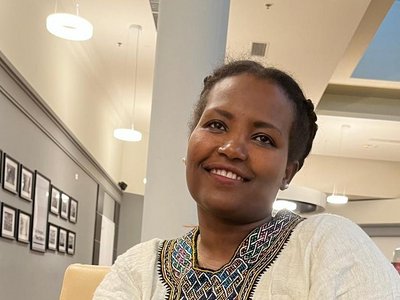

The study explores the deep-rooted socio-cultural and environmental factors shaping women’s nutrition. Using a socio-ecological framework, she uncovers how gender roles, religious practices, and household power dynamics contribute to inadequate dietary diversity—what scholars term “food violence.” Her work offers critical insights for gender-sensitive nutrition policies, advocating for structural change and a more equitable future for Ethiopian women.
In Ethiopia, there is a paucity of studies investigating the socio-cultural factors influencing the dietary behaviour of women of reproductive age (WRA). The quality of women's care plays a critical role in maternal and child nutrition, yet studies that provide a comprehensive overview of women's care and healthy environments in Ethiopia are limited. This study aims to understand the dietary behaviour and identify the socio-demographic, socio-cultural and environmental factors that influence the dietary behaviour of WRA. In addition, this study examines how women's care affects their ability to maintain a healthy diet.
The dissertation is based on a community-based cross-sectional study of 421 women of reproductive age (WRA), employing 24-hour dietary recall assessments to evaluate dietary diversity and its socio-demographic and socio-cultural determinants. Additionally, a mapping review was conducted to identify factors influencing pregnant women's dietary behaviour, care for women, and the broader food environment. Simegn employed a socio-ecological framework for the empirical study and, in the mapping review, introduced a novel analytical framework that integrates components of the socio-ecological model and the UNICEF framework on maternal and child nutrition. This approach provided a comprehensive analysis of dietary influences at multiple levels.
Findings
Simegn’s findings indicate that most women of reproductive age in the Amhara region, Ethiopia, have inadequate dietary diversity. Furthermore, beyond demographic factors such as age, education, and household size, socio-cultural factors significantly impact WRA dietary diversity. Key influential factors include cultural dietary restrictions, religious fasting, gender-based proverbs reinforcing inequalities, and household power dynamics, such as women’s limited decision-making authority over food purchases and their high workloads with insufficient support from male partners affect the dietary diversity of WRA. Additionally, insufficient access to food resources, clean water, and sanitation further exacerbates these challenges. Her literature review revealed that most existing studies focus on individual and household factors, while research at the community and institutional levels remains scarce. Factors such as women’s physical and psychological well-being, gender roles, cultural beliefs, and access to a healthy environment were found to be key influential factors but underexplored determinants of dietary behaviour. Her study reveals that there are structural and cultural constraints that limits women’s right to access and consume adequate nutritious diet that scholars describe as ‘’food violence’’ reinforcing cycles of malnutrition. There is further a research gap regarding care for women and a healthy environment in relation to dietary behaviour of WRA.
Although Ethiopia signed the Convention on the Elimination of All Forms of Discrimination Against Women (CEDAW) in 1980, gender-based food inequalities persist in Ethiopia. Her dissertation contributes valuable insights for designing culturally sensitive and context-specific dietary guidelines to support national nutrition policies and interventions. These findings align with the Sustainable Development Goals (SDGs), particularly SDG 2 (Zero Hunger), SDG 3 (Good Health and Well-being), and SDG 5 (Gender Equality).
Simegn’s study underscores the importance of nutrition-based training and awareness programmes that address socio-cultural influences on dietary behaviour. Additionally, it highlights the significance of women’s autonomy in improving nutrition, recommending gender-sensitive education reforms to challenge deeply rooted inequalities. Religious leaders, who hold significant influence in Ethiopian society, should also be involved in nutrition education initiatives to challenge misconceptions and promote alternative dietary practices, particularly during fasting periods.
A central contribution of her research is the emphasis on "care for women" within the socio-ecological framework, recognizing that women’s well-being is intrinsically linked to broader social and institutional support systems. Achieving sustainable improvements in dietary behaviour requires a comprehensive, gender-inclusive approach that challenges deep-seated norms, improves access to resources, and creates an environment where women can achieve adequate nutrition and lead healthier lives. Furthermore, her dissertation added Amharic proverbs and sayings as a novel determinant within the socio-ecological framework, an aspect previously unstudied in relation to gender inequality in food consumption.
Gender advocacy
Beyond her doctoral research, Simegn has been actively engaged in gender advocacy. Prior to her PhD, she worked extensively on promoting gender equality. In this role, she worked on raising awareness, advocating for girls’ rights, and supporting survivors of gender-based violence. Additionally, she has been involved in initiatives to empower female students through self-help clubs and mentorship programmes at Aksum University. she has participated in several gender equality, human rights, diet and women related programmes and conferences both nationally and internationally. Simegn’s academic and advocacy work continues to bridge the gap between research, policy, and practical interventions, striving to create a more equitable and nutrition-secure future for women in Ethiopia.
Alamirew Simegn Kassa completed her PhD in Social and Economic Sciences at the Institute of Development Research (IDR), BOKU University, Vienna under the supervision of Prof. Stefanie Lemke, Dr. Barbara Stadlmayr and Prof. Bernhard Freyer. The studies were funded by the Austrian Partnership Programme in Higher Education and Research for Development (APPEAR).
